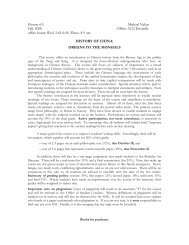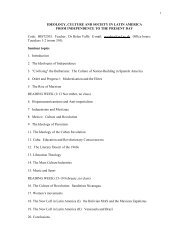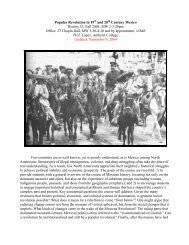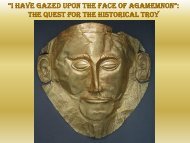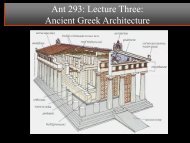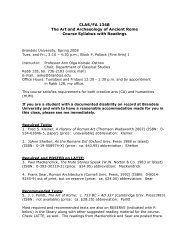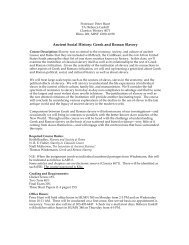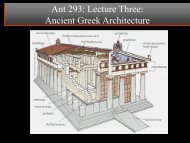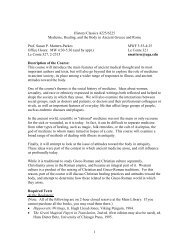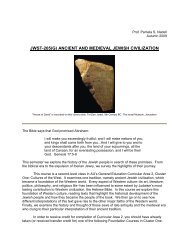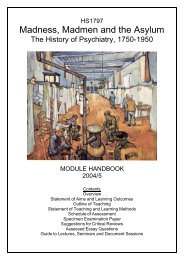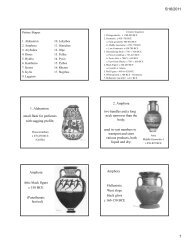HIST 141: History Of The Muslim World, I - Mister Dans Home Page
HIST 141: History Of The Muslim World, I - Mister Dans Home Page
HIST 141: History Of The Muslim World, I - Mister Dans Home Page
You also want an ePaper? Increase the reach of your titles
YUMPU automatically turns print PDFs into web optimized ePapers that Google loves.
DePaul University<br />
<strong>History</strong> <strong>141</strong>-101<br />
<strong>History</strong> of the <strong>Muslim</strong> <strong>World</strong>, 1:<br />
<strong>The</strong> Foundation of the First Global Civilization<br />
(600-1100 C.E.)<br />
M. W. 11:20-12:50<br />
Autumn 2009<br />
Instructor: Dr. Khaled Keshk, e-mail: kkeshk@depaul.edu<br />
Phone: 773 325 4466<br />
<strong>Of</strong>fice Hours: 2333 N. Racine Avenue: By appointment.<br />
This course fulfills understanding the past learning domain for the<br />
Liberal Studies Program.<br />
Course Description<br />
This course covers the rise and initial spread of the Islamic community, from<br />
its origins in Arabia to its emergence as a hemispheric wide civilization. This<br />
course will look at pre-Islamic Arabia, the life of the Prophet Muhammad, the<br />
caliphate, the conquests, the first and second civil war (which will be looked<br />
at in more detail), the Abbasid revolution, and finally the break-up of the<br />
empire in the 10 th / 11 th Century.<br />
Learning Goals:<br />
1. Students will acquire an historical knowledge of the rise of Islam.<br />
2. Students will be able to read and critically look at „primary‟ sources in<br />
translation.<br />
3. A working knowledge of historical theories that have and are being<br />
applied to the rise of Islam.<br />
4. <strong>The</strong> ability to understand and critique the above theories.<br />
Students with Disabilities<br />
Any student who feels the need to be accommodated because of a disability<br />
contact the instructor (in private) as soon as possible. Also please make sure<br />
you have contacted the proper facilities at DePaul:<br />
Plus Program (for LD, AD/HD) 325-1677 or<br />
http://studentaffaris.depaul.edu/plus/ and<br />
<strong>The</strong> <strong>Of</strong>fice for Students with Disabilities 325 1677<br />
http://studentaffairs.depaul.edu/studentswithdisabilities/
Hist. <strong>141</strong><br />
K. Keshk 2<br />
Course Requirements<br />
<strong>The</strong>re will not be an extra credit assignment as there are sufficient means for you to<br />
be able to pass this course. Students' grades will be based on the following:<br />
1. Midterm/Final: 25% each, of your grade. <strong>The</strong> date of the<br />
Midterm and Final are in your Syllabus. <strong>The</strong> form will be<br />
decided by instructor. <strong>The</strong>re will be no re-scheduling.<br />
2. Participation: 15% of your grade. Points will be deducted<br />
from excused and unexcused absences, as well as tardiness.<br />
Three unexcused absences will result in you failing the<br />
course. Just showing up will only give you 50% of your<br />
participation grade. Please consult the Student Handbook<br />
about the proper way to conduct yourself in class. <strong>The</strong><br />
following criteria will be used for assessing your<br />
participation:<br />
a. Frequency and clarity of your participation that shows<br />
you have read the materials assigned and reflected<br />
upon them carefully.<br />
b. Your ability to take an independent and informed<br />
stance with regards the ideas that are being presented<br />
in class.<br />
c. Your increased willingness and ability to contribute to<br />
class discussion through the duration of the course.<br />
3. Fact Quizzes: 10%. <strong>The</strong> instructor will assign 6 fact quizzes<br />
(you will be able to drop the lowest). <strong>The</strong>se quizzes are<br />
multiple-choice and in the case of the geographical ones, fill<br />
in, types of quizzes that have been created to check students‟<br />
knowledge of certain facts. <strong>The</strong> quizzes will cover such<br />
topics as names, dates, geographical areas, etc. <strong>The</strong> number<br />
of questions will range from five to twenty.<br />
4. Group Paper and Presentation: 25% of your grades.<br />
Students will be assigned a group project that they will have<br />
to present in class. <strong>The</strong>re will be a paper that accompanies<br />
this project , which should be no more than 10 pages in<br />
double spaced length. An electronic copy is to be sent to<br />
turnitin.com and a hard copy to the instructor on the day it is<br />
due. (late papers will not be accepted).
Hist. <strong>141</strong><br />
K. Keshk 3<br />
Grading<br />
University Policy will not allow the instructor to change your<br />
grade after the quarter is over unless it is a clerical error. So<br />
please decide whether you want to withdraw in the time allotted<br />
by University Policy. Absolutely no Incompletes will be given.<br />
Please, let me remind you that simply coming to class does not<br />
give you an automatic ‘A’ you have to show that you have<br />
mastered the material. You are not graded on your effort but on<br />
your performance, i.e. your final product is what the instructor<br />
sees and the only concrete evidence that the instructor can<br />
honestly assess.<br />
1. A= 100-95/A- = 95-90: This grade is given to the exceptional student, who<br />
has shown a thorough and critical understanding of the readings, participated<br />
with engaging questions and answers during class, and has been able to score<br />
the highest points on their quizzes and exams. Has handed an exceptional<br />
paper (well argued, well written, well organized).<br />
2. B+ = 90-85: B= 85-80; B- =80-75: This grade is given to the above average<br />
student, who has a good grasp of the material, is able to participate regularly<br />
in class discussions, did above average work on exams and paper (a few<br />
mistakes in grammar, organization, and argument).<br />
3. C+ = 75-70; C=70-65; C- =65-60: This grade is given to the average student,<br />
who has done satisfactory work, participated minimally, average marks on<br />
exams and paper ( weak in argument, poorly organized, and poor grammar).<br />
4. D= 60-55; F= < 54: This grade is given to the below average student, who has<br />
shown no understanding of the material, hardly participated in class, failed<br />
more than one assignment and handed a very poor paper (poor argument, very<br />
poor grammar, and no organization).<br />
PLAGIARISM<br />
Students in this course should be aware of the strong sanctions against<br />
plagiarism stated in the current Bulletin/Student Handbook. If proven, a<br />
charge of plagiarism could result in an automatic "F" in the course and<br />
possible expulsion. If you have any questions or doubts about what<br />
plagiarism entails or how to properly acknowledge source materials and<br />
the works of others, be sure to consult the instructor. Proper citation<br />
procedures are provided in all standard writing manuals.
Hist. <strong>141</strong><br />
K. Keshk 4<br />
Miscellaneous Concerns<br />
Although the following should be already known, it does not hurt to remind<br />
you of important ‘dos’ and ‘don’ts’: No cell pones are to be on during class (points<br />
will be deducted if they are or if you text message). No talking during lectures, no<br />
internet surfing, (if you persist in any of these, points will be deducted and you might<br />
be asked to leave the class). Don’t come to sleep in my class do it at home. All e-<br />
mails should be sent at appropriate times. I am very interested and eager to hear from<br />
you in office hours or via email. But please remember that email to your professor is<br />
considered a formal, academic communication and should be treated as such.<br />
Instructor is not responsible for the loss of any financial aid or awards due to<br />
student’s bad performance; Students must be courteous of their fellow classmates at<br />
all times.<br />
Textbooks<br />
Some of the following books can be found at the University Bookstore, the<br />
others are on Reserve in the Library at the Lincoln Park Campus.<br />
Required:<br />
Vernon O. Egger, A <strong>History</strong> of the <strong>Muslim</strong> <strong>World</strong> to 1405: <strong>The</strong> Making of a<br />
Civilization. (ISBN: 0-13-098389-6)<br />
Hugh Kennedy, <strong>The</strong> Prophet and the Age of the Caliphates. (ISBN: 0-582-<br />
40525-4)<br />
Recommended: Note that all recommended texts are also on reserve:<br />
Marshall G.S. Hodgson, <strong>The</strong> Venture of Islam, Vol. 1.<br />
On Reserve (Required Readings):<br />
<strong>The</strong> following material can be accessed by logging onto:<br />
http://eres.lib.depaul.edu/eres/coursepage.aspxcid=4111<br />
<strong>The</strong> Password: hst<strong>141</strong><br />
<strong>The</strong> <strong>History</strong> of al-Tabari, Volume 19 <strong>The</strong> Caliphate of Yazīd b. Muʽāwiya<br />
trans. By I.K.A. Howard; <strong>The</strong> <strong>History</strong> of al-Tabari Vol. 20 <strong>The</strong> Collapse of<br />
Sufyānid Authority and the Coming of the Marwānids trans. By G.R.<br />
Hawting; <strong>The</strong> <strong>History</strong> of al-Ṭ abari: <strong>The</strong> Victory of the Marwānids trans. By<br />
Micahel Fisbein. Khaled Keshk, <strong>The</strong> Historians’ Muʽāwiya.<br />
On Reserve (Recommended Readings): Hugh Kennedy, <strong>The</strong> Early Abbasid<br />
Caliphate.
Hist. <strong>141</strong><br />
K. Keshk 5<br />
Schedule<br />
Week One (1/2)<br />
Wednesday-9/9/09<br />
Introduction to the Course: Overview and Requirements.<br />
Week Two<br />
Monday-9/14/09<br />
Introduction II. Arabic names.<br />
Assignment: Egger: pp. xv-xvi; pp. 1-3. Reserve: Kennedy: pp. xiii-xiv.<br />
Hodgson: pp. 3-22; 60-69.<br />
Wednesday- 9/16/09<br />
Pre-Islamic Arabia. Assign Groups.<br />
Assignment: Egger: pp. 4-20. Reserve: Kennedy: pp. 1-29. Hodgson: pp. 146-<br />
158.<br />
Week Three<br />
Monday-9/21/09<br />
<strong>The</strong> rise of Islam.<br />
Assignment: Egger: pp. 20-31. Reserve: Kennedy: pp. 29-50. Hodgson: pp.<br />
158-183; 187-197.<br />
Wednesday-9/23/09<br />
<strong>The</strong> other theories on the rise of Islam.<br />
Assignment: Reserve: Keshk: pp. 13-21; Blackboard: Crone (Muh.); Peters<br />
(Muh.); Watt (Muh.); Rodinson (Muh.).<br />
Week Four<br />
Monday-9/28/09<br />
<strong>The</strong> Rashidun Caliphs I.<br />
Assignment: Egger: pp. 33-38. Reserve: Kennedy: pp. 50-57. Hodgson: pp.<br />
197-200.<br />
Wednesday-9/30/09<br />
<strong>The</strong> Rashidun Caliphs II [Conquest I]<br />
Assignment: Egger: pp. 38-44. Reserve: Kennedy: pp. 57-69, Hodgson: pp.<br />
200-212. Blackboard: Donner.
Hist. <strong>141</strong><br />
K. Keshk 5<br />
Week Five<br />
Monday-10/5/09<br />
Review for Midterm and Presentation/Groups<br />
Wednesday-10/7/09<br />
Midterm.<br />
Week Six<br />
Monday-10/12/09<br />
<strong>The</strong> Rashidun III and IV and the First Civil War.<br />
Assignment: Egger: pp. 62-66. Reserve: Kennedy: pp. 69-81. Hodgson: pp.<br />
212-217; Keshk: pp. 53-66; 85-93.<br />
Wednesday-10/14/09.<br />
<strong>The</strong> Caliphate/<strong>The</strong> Umayyads.<br />
Assignment: Egger: pp. 44-54; 80-83. Reserve: Kennedy: pp. 82-122.<br />
Hodgson: pp. 241-247.<br />
Week Seven<br />
Monday-10/19/09<br />
Second Civil War and the Caliphate.<br />
Assignment: Egger: pp. 66-69; 83-84. Blackboard: God’s Caliph: Intro,<br />
Umayyad, Abbasid; Saber Religioso; Keshk: Historiography of an Execution<br />
; Rubin: Umayyads<br />
Wednesday-10/21/09<br />
Shi‟ism and the Abbasid Revolution.<br />
Assignment: Egger: pp.69-80; 85-94. Reserve: Kennedy: pp. 123-155<br />
(recommended: pp. 156-198); Hodgson: pp. 272-279; 284-296. Blackboard:<br />
Madelung: Ahl al-Bayt<br />
Week Eight<br />
Monday-10/26/09<br />
<strong>The</strong> Break Up and the <strong>Muslim</strong> Commonwealth.<br />
Assignment: Egger: pp. 94-114; 142-170. Reserve: Kennedy: pp. 198-247;<br />
307-342 (recommended: pp. 248-307).<br />
Wednesday-10/28/09<br />
<strong>The</strong> Second Civil War: “<strong>The</strong> Problem with Yazīd.” Start<br />
Presentations<br />
Assignment: Keshk: pp. <strong>141</strong>-175; Start reading Ṭ abarī volume 19 (as a class);<br />
Blackboard: “Yazīd” “al-Husayn”
.<br />
Hist. <strong>141</strong><br />
K. Keshk 6<br />
Week Nine<br />
Monday-11/2/09<br />
<strong>The</strong> Second Civil War: <strong>The</strong> battles,<br />
Assignment: Reserve Finish Ṭ abarī vol. 19 and start vol. 20 (as a class).<br />
Blackboard: “Karbala” “al-Harra” and „Mardj Raḥ īt” (only the 684 Battle for<br />
this particular article).<br />
Wednesay-11/4/09<br />
<strong>The</strong> Second Civil War: <strong>The</strong> emerging leadership.<br />
Assignment: Finish Ṭ abarī vol. 20 and start vol. 21 (as a class). Blackboard:<br />
“Ibn al-Zubayr” “Al-Mukhtār” “Ibn al-Ḥanafiyya” “Marwān.”<br />
Week Ten<br />
Monday-11/9/09<br />
<strong>The</strong> Second Civil War: <strong>The</strong> Marwānids.<br />
Assignment: Finish Ṭ abarī vol. 21 (as a class) Blackboard: “Abd al-Malik.”<br />
Wednesday-11/11/09<br />
Conclusions. Quiz 5.<br />
Week Ten (1/2)<br />
Monday-11/16/09<br />
Review for Final.<br />
Your Final is on Wed 11/18/09 from 11:45-2:00 [points will be deducted<br />
from late comers].



